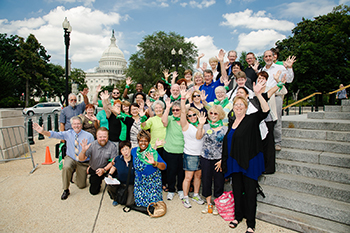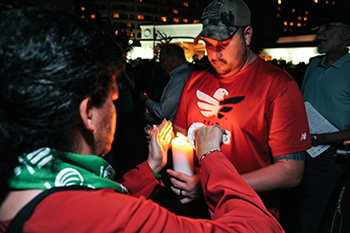Sep 9, 2014
 NAMI National Convention attendees march on Capitol Hill.
NAMI National Convention attendees march on Capitol Hill.It’s over now, but NAMI’s National Convention, held this year in Washington, D.C., will have an impact that will extend well into 2015. As always, the convention was informative, inspiring and colorful, chock-full of speakers, workshops and even performance art. (See the pictures here.)
“On the first day, we were inspired by Patrick Kennedy, Creigh Deeds and Demi Lovato and we went charging up Capitol Hill,” said NAMI Executive Director Mary Giliberti, referring to the convention’s National Day of Action .
“On the last day we listened intensely to Dr. Thomas Insel, give a tour de force through scientific research.”
Insel, director of the National Institute of Mental Health (NIMH) focused on the need for early-onset interventions and public education. He also called for not just expanding access to mental health services, but also for insisting on quality of treatment.
“There is no Food and Drug Administration, no regulatory framework [for many treatment practices],” he said.
Finding Common Ground
A special policy forum, “Refocusing the Conversation: Strategies for Engaging People in Needed Services and Supports” included what was termed the most “divisive topic” in the mental health community: civil commitment and court-ordered treatment. Broad areas of agreement emerged than many might have expected: that court-ordered treatment should only be used as a last resort and that in the long-run, positive relationships make the difference for recovery rather than coercion. More fundamentally, unanimity existed over the need for insurance parity, greater investment in mental health care overall and better treatment options.
NAMI National Board Member Mike Weaver of North Carolina, compared engagement to a person entering a coffee shop. “You want things that make you want to go back,” he said. In some cases, however, treatment experiences can be as traumatic as the illness itself.” The first step must include respect for individual dignity.
Another participant pointed out, “Legal action may be a tool of last resort, but the real question is: why are we so short of so many other tools?”
Doris Fuller, executive director of the Treatment Advocacy Center (TAC), said, “There is not one tool that works for every single patient, but every patient deserves a chance to recover.” She noted the challenge for persons with histories of leaving treatment, leading to a “revolving door” of homelessness, hospitalizations or encounters with the criminal justice system.
Laughter and Tears
It’s almost impossible to convey an entire NAMI National Convention. From Ask the Doctor Sessions about the latest research and treatment developments on mental illness to poster sessions on service dogs and mental wellness on college campuses, just about every topic is covered.
Laughter yoga sessions helped convention attendees renew “happy” chemicals in the brain as a break from intense discussions. At the same time, some members were brought to tears by first-person accounts of failings in the mental health care system—and by the convention’s candlelight vigil in memory of the 22 veterans who die from suicide every day.
 Participants in the candlelight vigil held in memory of the 22 veterans who die from suicide every day.
Participants in the candlelight vigil held in memory of the 22 veterans who die from suicide every day.While the convention began with the participation of recording artist and actress Demi Lovato in the National Day of Action, it closed with the music of Jason DeShaw, a Montana cowboy, who received one of NAMI’s highest honors, the Lionel Aldridge award for courage, service and leadership by a person living with mental illness. Diagnosed with bipolar disorder, De Shaw performed at the Montana State Hospital earlier this year, as well as in venues in 35 other states, sharing messages of recovery. He called the NAMI presentation “the best night of my life.”
Honorees and Electees
The convention’s closing banquet also honored Vice President Joe Biden and Dr. Jill Biden with NAMI’s Distinguished Service Award for exceptional efforts in working to improve the lives of individuals and families living with mental illness. Dr. Jill Biden’s commitment to helping people with mental illness dates to the 1980s when she taught English and reading to teens in a Delaware psychiatric facility; more recently she had led initiatives to expand mental health training among nurses and social workers.
“NAMI is non-partisan,” said NAMI Medical Director Ken Duckworth, who emceed the awards program. “Mental illness does not discriminate. It can strike Democrats and Republicans and their families alike. Even in Washington, D.C., some issues transcend politics.”
Cook County Sheriff Tom Dart of Chicago received the Sam Cochran Criminal Justice Award for compassionate reform leadership and Amanda Swindle, a senior at Christopher Newport University in Virginia, received NAMI’s Young Adult Leadership Award.
Congressional, state and local elections are two months away, but each year at NAMI’s conventions, grassroots leaders elect members of the NAMI national board, which in turn elects its officers.
Elected this year as National Board President was Jim Payne, a former president of NAMI Virginia, who has served as interim national board president since June 2014. Two new board members were elected to the 16- member board: Dr. Jim Hayes of South Carolina and Adrienne Kennedy of Texas. Three incumbents were elected to new terms: Janet Edelman of Md., Ron Morton of Tenn. and Marilyn Ricci of Conn. Ricci will now serve as second vice president, after having served previously as national board secretary.
Looking Forward
National conventions serve many functions: education, networking, identifying common issues and developing a common vision. After four days, many convention attendees returned home knew ideas and energy to carry them forward. That momentum will include Mental Illness Awareness Week (MIAW), Oct. 5-11 and civic education for Election Day, Nov. 4, as convention dialogue leads to action.
Next year’s convention will be July 6-9, 2015 in San Francisco. So mark it on your calendar and begin planning a trip to the City by the Bay.

